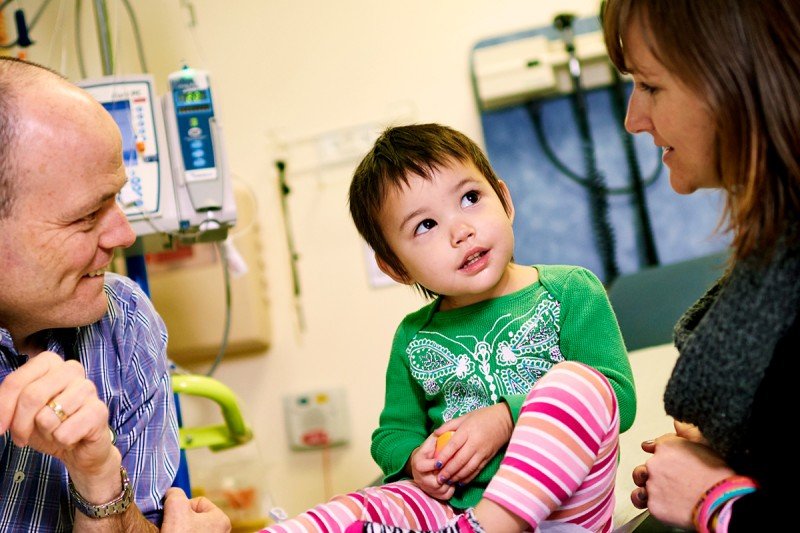
The Most Experienced Childhood Neuroblastoma Program in the Country
Hearing that your child has neuroblastoma can be frightening and overwhelming. It can be daunting to think about the treatments your child may need and how the experience will affect your child, your family, and you. The neuroblastoma team at MSK Kids offers you leadership, expertise, reassurance, support, and compassion to give your child the best chance of a cure, a good quality of life, and the best chance for a promising future.
We treat people of all ages and have experience managing every stage of neuroblastoma cancer, with special expertise in caring for those with aggressive disease and those whose cancer has come back. Many of our patients are cured of the disease and go on to lead happy, healthy lives.
Many of our patients are cured of the disease and go on to lead happy, healthy lives.
Today, thanks largely to the efforts of MSK Kids, neuroblastoma that has not spread throughout the body is curable. Sometimes all that is needed is surgery alone. And now, more than half of children with neuroblastoma that has spread survive — ten times the survival rate in the 1980s.
What is neuroblastoma cancer?
The nervous system includes the central nervous system (the brain and spinal cord) and the peripheral nervous system (the nerves that branch off the central nervous system and connect with all other parts of the body).
Neuroblastoma is a rare cancer that develops in a part of the peripheral nervous system called the sympathetic nervous system. Neuroblastoma cancer is diagnosed in about 700 children in the United States each year. Since some of the sympathetic nervous system cells are concentrated in the adrenal glands, which sit above the kidneys, neuroblastoma often starts growing there.
Neuroblastoma develops in very early forms of nerve cells that are usually found in a developing baby, which explains why children as young as newborns can develop this cancer. In fact, neuroblastoma is the cancer most often found in infants. Tumors typically begin in the belly, neck, chest, pelvis, or adrenal glands. Neuroblastoma can spread to other parts of the body, including the bones. Doctors and scientists don’t yet know what causes this cancer, but our researchers are working hard to find out.
Why come to MSK Kids for neuroblastoma care?
The largest team, the most discoveries, care for your whole child — MSK Kids treats more children with neuroblastoma cancer than any other hospital in the United States. Each child teaches our team something new. Combining all of that knowledge enables us to better understand the disease and devise more-effective treatments that help children with neuroblastoma everywhere, far beyond the walls of our hospital. Here are some reasons to bring your child to MSK Kids for care:
Your Child’s Care Team
MSK Kids is home to the largest team of professionals focused on neuroblastoma. Surgeons, medical oncologists, radiation oncologists, pathologists, radiologists, nuclear medicine specialists, nurses and nurse practitioners, psychosocial support staff, and others all pool their expertise. Together, we ensure that your child receives the most-advanced care in the way that best meets their needs.
Pioneering Neuroblastoma Research
For more than three decades, MSK Kids investigators have developed innovative immunotherapies that have helped transform the landscape of neuroblastoma by increasing survival rates. Our team has invented more new drugs, filed more patents for new treatments, and licensed more new drugs to industrial partners for neuroblastoma than doctors at any other hospital. The MSK Kids program is the only one to be granted two Breakthrough Therapy Designations for neuroblastoma from the US Food and Drug Administration. Our scientists continue to explore the intricacies of the disease to better understand it and design more-effective therapies that can be evaluated in clinical trials at MSK, with the ultimate goal of someday curing every child with neuroblastoma.
Tumor Genetic Sequencing
At MSK Kids, every child’s tumor is analyzed to understand its genetic features. Based on the results, each child receives a personalized plan of care. This testing paints the clearest picture of your child’s cancer so we can understand the biological factors driving its growth, how aggressive it may be, and how it is best treated. Genetic sequencing ensures that your child receives the therapies that are likely to be most effective, with the fewest side effects.
MSK Offers Every Treatment Available for Neuroblastoma
Not all hospitals offer every possible treatment for neuroblastoma. At MSK Kids, we do. Advanced surgical techniques, novel chemotherapies, antibodies, cancer vaccines, radiation therapy with proton therapy, and liquid radiation therapy, such as MIBG therapy — we have every tool in our arsenal to treat neuroblastoma. That means if your child’s cancer comes back or continues to grow after treatment, we’ll try another, and another, and another until we find the one that stops the cancer for good.
Letting Your Child Be a Child
In addition to the world’s best neuroblastoma therapies, the neuroblastoma program at MSK Kids has services that nurture your child’s recreational, educational, and social needs. Ours is the only neuroblastoma program offering dedicated play therapy and meditation to relax and relieve anxiety. Through our Integrative Medicine Service, your child can enjoy music therapy, mind-body therapies, dance and movement therapy, yoga, and other services.






